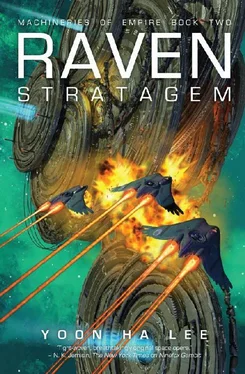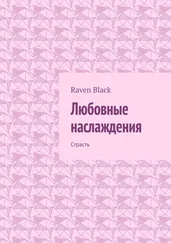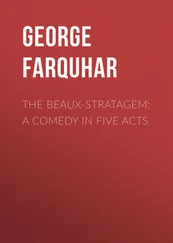“Don’t tell me you never tire of the endless wheel of failed heresies.” His words spoke of one thing. His eyes, as sweet and merciless as ashes, spoke of another. He reached out, hand pausing just short of Khiruev’s jaw.
Khiruev knew where this was leading. Her disappointment in Jedao was almost as great as her desire. Even so, Jedao’s phrasing was sufficiently ambiguous that Khiruev could construe it as a simple remark. And so she had the defense permitted even a fledge-null. She stared mutely at Jedao and waited to see if he would force the issue.
Over her lifetime, Khiruev had failed at all her relationships. She hadn’t dated until she was in her thirties; had only managed a single short-lived, dismal marriage. Or maybe it had started earlier, with the mawkish tone poem she had composed for an alt when she was fourteen, only to think better of ever playing it for anyone. (She still remembered every note.)
Upon reflection, the marriage had been a disaster from the beginning. She had been thirty-seven, awestruck by the beautiful, elegant singer, Dosveissen Moressa, and her ability to come up with double entendres for engineering jargon, to say nothing of her dazzling smile when she brought her gifts. Moressa’s favorite had been the music box Khiruev had restored for her, exquisite decoupage tigers on the outside and, once opened, an endless hunt of clockwork figures.
Moressa and Khiruev had contracted for a year after dating for several months. A year was a pitiable length of time for a marriage contract. The relationship cooled off after five months. Khiruev had been so convinced at the outset that they were being rational about building something lasting. Who would have guessed that a conservative approach to romance would end so badly? But the fact that they had rarely discussed long-term plans, even after they’d known each other intimately, should have warned her that they would founder on fundamental points.
The funny thing was, years later, Khiruev couldn’t remember the topic of the quarrel that had finally driven a spike into the relationship, in part because the topic was sideways to the emotional undercurrents. Moressa had spoken in a voice that was never anything but calm, yet at the end her face twisted with frustration. Even when you laugh you never smile, she’d finally burst out.
I have no idea what you’re talking about, Khiruev said, just as calmly. The lie knifed between them. Moressa stalked out of the apartment after an icy pause rather than continue looking at her. Khiruev stared at the sudden meaningless detritus of figurines and jewelry scattered around the apartment for the rest of the night. Moressa never returned. Indeed, they communicated only once for the rest of the marriage (the rest of their lives), to negotiate over some fine point of mutual finance that neither of them cared about. Even then they didn’t meet in person.
Khiruev hadn’t told either of her mothers about the whole debacle, which had taken a great deal of finessing. They would have been unbearably understanding or, worse, inclined to blame Moressa. In fact, Moressa’s only transgression had been telling the truth.
After that, Khiruev made a point of consciously sabotaging all her relationships by choosing unsuitable partners on the grounds that this beat doing it unconsciously. Khiruev was most ashamed of the time she’d picked out a man who’d been a refugee and who begged her over and over to leave the Kel and do something safe. Khiruev had never contemplated abandoning her career, least of all for a lover who grated on her almost from the beginning. It wasn’t anything the man did so much as the constant reminder that Khiruev was in the business of creating refugees when she wasn’t creating orphans and corpses.
She had thought she had her heart under control, by which she meant that she had memorized the usual trajectories and had well-established protocols for dealing with the inevitable recriminations and breakups. It served her right to be confronted by a man who could demand her devotion in more than the usual sense, who had a dark history with the Kel, and who had no reason to fear the execution that would ordinarily await a soldier who slept with a soldier; who might well miss even the cold facsimile of companionship.
Jedao’s hand shook visibly. “It would be so easy,” he said to himself. His thumb grazed Khiruev’s chin. Khiruev froze. It was as though her heart had crystallized inside her.
Then Jedao sighed and stepped backwards, and sank back down into the chair. “There are things I will do and things I will not do,” he said simply. “But I don’t blame you for believing the worst.” He didn’t look all that convinced himself.
Khiruev knew better than to pretend that she had been thinking about something else. “It doesn’t matter one way or another.”
“But it does,” Jedao said, hot and cold and sharp at once. “This is exactly what matters. The difference between what should and should not be done. This is what the fight’s about.”
“Someday I will understand you, sir,” Khiruev said, meaning it.
“I hope so,” Jedao said. This time the smile lasted longer.

CHAPTER ELEVEN
EVERY MORNING, MIKODEZ had a Kel infantry ration bar for breakfast. According to the Kel, consuming them voluntarily suggested interesting things about your mental health. Mikodez ate them in the hopes that they would immunize him to any poisons, and because they seemed to make his medications more effective. He knew poisons didn’t work that way, and that the latter effect was illusory, but it was a nice thought. Besides, he had to do something to atone for all the candy he put in his system.
He’d opted to get to the conference room forty-eight minutes early and eat there, on the grounds that he was getting bored of the decor in his offices. All his offices. There was more than one of them, for reasons that were not entirely clear. The architects who had designed the Citadel had included Shuos, with Shuos habits of thought. His favorite hadn’t originally been an office, but had been converted to one as a test of variable layout, which Mikodez considered very brave of that long-vanished heptarch. (Said heptarch had died shortly after, not because of variable layout, or the Citadel’s security. She’d attended a meeting on some distant planet and caught what might or might not have been a bioengineered disease.)
“You have the stupidest eating habits of anyone in the entire Citadel,” Istradez said. “If anyone else did that, they’d get dinged on all the medical evaluations.” He had already finished his own breakfast, consisting of seaweed soup, rice, a modest scallion pancake, and Kel pickles.
“So how’s your latest girlfriend?” Mikodez was frowning at his tablet, which he had set at a comfortable angle in its holder so he wouldn’t get a crick in his neck staring down at it. “I hope you’re not bored with her already. I can only hand out security clearances so fast.”
“Just how much detail did you want me to go into?”
“Kind of not.”
Istradez smirked at him. “You want me to clear out so you can have your meeting?”
Mikodez’s senior staff knew about his doubles, including Istradez, and even the general populace had some idea that he used them from time to time. Not all of Mikodez’s advisers approved of him using a non-Shuos for the role, but he’d pointed out that no one else knew him as well as the younger sibling he’d grown up with. Istradez was only one year younger than he was. Their parents joked that they’d been meant to be twins, except they had realized that two of them at once would have been overkill.
Читать дальше













